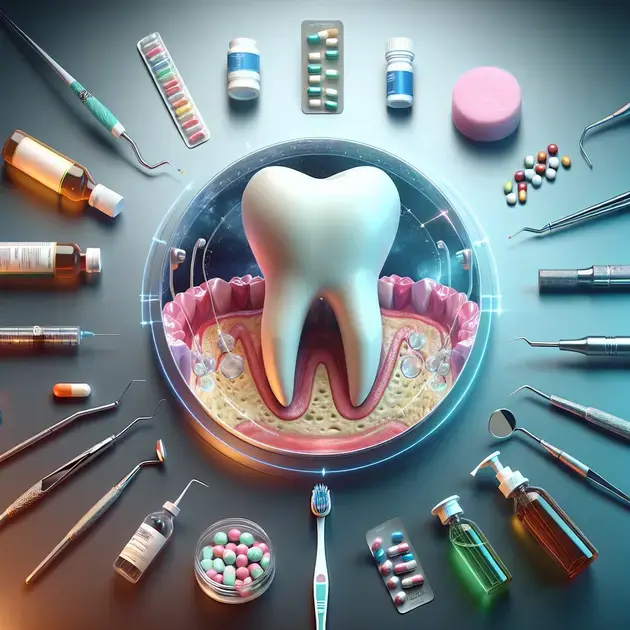When it comes to treating periodontitis, finding effective medication options is crucial for managing this common dental condition. Periodontitis, also known as gum disease, is an inflammatory disease that affects the soft and hard structures supporting the teeth. Without proper treatment, periodontitis can lead to serious complications such as tooth loss and systemic health issues.
In recent years, several medication options have shown promising results in treating periodontitis. From antimicrobial mouthwashes to antibiotic gels, these medications can help reduce inflammation, control bacterial growth, and promote healing of the gum tissues. By incorporating these effective medication options into a comprehensive treatment plan, patients can improve their oral health and prevent the progression of periodontitis.

Effective Medication Options for Periodontitis Treatment
Periodontitis is a serious gum infection that damages the soft tissue and destroys the bone that supports your teeth. Along with professional dental treatment, medication can play a crucial role in managing and treating periodontitis effectively. Here are some effective medication options that can aid in the treatment of periodontitis:
1. Antibiotics:
Antibiotics are commonly prescribed to combat the bacterial infection causing periodontitis. Common antibiotics used in periodontal treatment include doxycycline, minocycline, and metronidazole. These antibiotics can be taken orally or applied directly to the infected gum pockets to help eliminate the harmful bacteria.
2. Antiseptic Mouthwashes:
Antiseptic mouthwashes containing chlorhexidine or essential oils can help reduce plaque and gingivitis, which are contributing factors to periodontitis. These mouthwashes can be used as an adjunct to regular brushing and flossing to improve gum health.
3. Enzyme Suppressants:
Enzyme suppressants like doxycycline can help reduce the activity of enzymes that break down the gum tissue. By inhibiting these enzymes, the progression of periodontitis can be slowed down, allowing the gums to heal and regenerate.
4. NSAIDs:
Nonsteroidal anti-inflammatory drugs (NSAIDs) can help reduce inflammation and pain associated with periodontitis. Medications like ibuprofen or aspirin can be used to alleviate discomfort and swelling in the gums.
5. Bone Growth Stimulants:
In cases where significant bone loss has occurred due to periodontitis, bone growth stimulants may be prescribed to promote the regeneration of bone tissue. These medications can help restore the bone support around the affected teeth.
Promising Medication Options for Managing Periodontitis
As our understanding of periodontitis continues to evolve, new medication options are being explored to improve the management of this common dental condition. Here are some promising medication options that show potential in managing periodontitis:
1. Host Modulation Therapy:
Host modulation therapy aims to modify the body’s response to periodontal pathogens, reducing inflammation and tissue destruction. Medications like sub-antimicrobial dose doxycycline (SDD) have shown promise in managing periodontitis by targeting host factors involved in the disease process.
2. Probiotics:
Probiotics are beneficial bacteria that can help restore the natural balance of oral microbiota and combat harmful bacteria associated with periodontitis. Consuming probiotic supplements or foods like yogurt may help support gum health and reduce inflammation.
3. Herbal Remedies:
Some herbal remedies, such as green tea extract or turmeric, have anti-inflammatory and antibacterial properties that can benefit individuals with periodontitis. Incorporating these natural remedies into your oral hygiene routine may provide additional support in managing the condition.
4. Local Drug Delivery Systems:
Local drug delivery systems deliver medication directly to the infected gum pockets, ensuring targeted treatment of periodontitis. These systems can enhance the effectiveness of traditional periodontal therapy and improve outcomes for patients with advanced gum disease.
5. Photodynamic Therapy:
Photodynamic therapy involves the use of light-activated compounds to target and destroy harmful bacteria in the gum tissue. This innovative approach to treating periodontitis shows promise in reducing infection and promoting healing of the gums.
Incorporating Medication Options into Your Periodontitis Treatment Plan
When developing a comprehensive treatment plan for periodontitis, incorporating medication options can enhance the effectiveness of traditional therapies and promote better oral health outcomes. Here’s how you can integrate medication options into your periodontitis treatment plan:
1. Consult with a Dental Professional:
Before starting any medication for periodontitis, consult with your dentist or periodontist to discuss the most appropriate options for your condition. They can recommend the best medications based on the severity of your gum disease and overall oral health.
2. Follow Medication Instructions Carefully:
It’s important to follow the prescribed dosage and instructions for taking any medication for periodontitis. Make sure to take the medication as directed by your healthcare provider to maximize its effectiveness and minimize potential side effects.
3. Maintain Good Oral Hygiene:
In addition to medication, maintaining good oral hygiene practices is essential for managing and preventing periodontitis. Brushing twice a day, flossing daily, and using antiseptic mouthwashes can help control bacterial growth and maintain gum health.
4. Monitor Your Progress:
Regularly follow up with your dental provider to monitor the progress of your periodontitis treatment. They can assess the response to medication, make any necessary adjustments to your treatment plan, and ensure that your oral health is improving over time.
5. Stay Informed About New Developments:
Stay informed about new medication options and advancements in periodontal treatment by reading reputable sources and staying up to date with the latest research. Discuss any promising medication options with your dental provider to see if they may benefit your treatment plan.

Promising Medication Options for Managing Periodontitis
Periodontitis, a serious gum infection that damages the soft tissue and destroys the bone that supports your teeth, requires comprehensive treatment to manage effectively. Recent advancements in medication options have provided new promising solutions for managing periodontitis. These medications are designed to target the underlying causes of the disease and reduce inflammation in the gums.
One promising medication option for managing periodontitis is the use of antimicrobial agents. These agents work by targeting and killing the bacteria that cause gum disease, helping to control the infection and prevent further damage to the gums and supporting structures. Antimicrobial agents can be applied directly to the affected areas or taken orally as part of a treatment regimen.
In addition to antimicrobial agents, host modulation therapy is another promising medication option for periodontitis management. This therapy focuses on modulating the body’s immune response to reduce inflammation and promote healing in the gum tissues. By addressing the immune system’s role in gum disease, host modulation therapy can help improve treatment outcomes and prevent disease progression.
Another medication option that shows promise in managing periodontitis is the use of enzyme suppressants. These medications work by inhibiting the activity of enzymes that break down the connective tissues in the gums, helping to preserve the integrity of the gums and prevent further tissue damage. By targeting the enzymes involved in gum disease, enzyme suppressants can help support the effectiveness of other periodontal treatments.
Overall, the development of these promising medication options for managing periodontitis offers new hope for patients seeking effective treatment for this serious gum disease. By incorporating these medications into a comprehensive periodontal treatment plan, individuals can take proactive steps to protect their oral health and prevent the progression of periodontitis.
Incorporating Medication Options into Your Periodontitis Treatment Plan
When creating a treatment plan for periodontitis, it is important to consider the incorporation of medication options to enhance the effectiveness of the overall therapy. By incorporating medication into your periodontitis treatment plan, you can target the underlying causes of the disease and improve treatment outcomes.
One key aspect of incorporating medication options into your periodontitis treatment plan is to consult with a dental professional to determine the most suitable medications for your specific condition. Your dentist or periodontist can assess the severity of your gum disease and recommend the appropriate medications to help manage the infection and promote healing in the gums.
It is essential to follow the prescribed dosage and treatment regimen when incorporating medication options into your periodontitis treatment plan. Consistent use of the medication as directed by your dental provider is crucial for achieving optimal results and effectively managing the disease.
Furthermore, integrating medication options with other periodontal treatments, such as scaling and root planing or surgical interventions, can enhance the overall effectiveness of the treatment plan. By combining different treatment modalities, you can address the various aspects of periodontitis and improve the health of your gums and supporting structures.
Overall, incorporating medication options into your periodontitis treatment plan can help you achieve better control of the disease and prevent further progression of gum infection. By working closely with your dental provider and following the recommended treatment strategies, you can optimize the outcomes of your periodontal therapy and maintain a healthy smile.
Maximizing the Benefits of Antibiotics and Mouthwash
Antibiotics and mouthwash play a crucial role in the management of periodontitis, offering additional benefits to traditional periodontal treatments. By maximizing the benefits of these medications, individuals can enhance the effectiveness of their oral hygiene routine and support the healing process in the gums.
One key strategy for maximizing the benefits of antibiotics and mouthwash in periodontitis management is to use these medications as directed by your dental provider. Following the prescribed dosage and treatment frequency is essential for achieving optimal results and controlling the infection in the gums.
In addition, combining antibiotics with scaling and root planing procedures can help boost the effectiveness of the treatment and reduce the bacterial load in the gum pockets. This combined approach can target the bacteria causing the infection more effectively and promote healing in the gum tissues.
Using an antimicrobial mouthwash as part of your daily oral hygiene routine can also provide added benefits in managing periodontitis. Mouthwash can reach areas of the mouth that are difficult to clean with a toothbrush or floss, helping to reduce plaque buildup and bacteria that contribute to gum disease.
Regular use of mouthwash can complement your brushing and flossing routine, providing an extra layer of protection against gum infection and promoting overall oral health. By incorporating mouthwash into your daily oral care regimen, you can improve the outcomes of your periodontitis treatment and maintain a healthy mouth.
Conclusion
Embracing the promising medication options for managing periodontitis unveils a new realm of hope for individuals battling this severe gum infection. The advent of antimicrobial agents, host modulation therapy, and enzyme suppressants signifies a breakthrough in addressing the root causes of periodontitis while curbing inflammation in the gums.
Integrating these medications into a comprehensive periodontal treatment plan underlines a proactive stance towards safeguarding oral health and halting the progression of periodontitis. Consulting with dental professionals to tailor medication options to specific conditions and adhering to prescribed dosages and treatment regimens are pivotal steps towards optimal results in managing the disease effectively.
Furthermore, combining medication options with traditional periodontal treatments like scaling, root planing, and surgical interventions can amplify the overall efficacy of the treatment plan. This synergistic approach not only targets various facets of periodontitis but also fosters the well-being of gums and supporting structures, fostering a healthier smile and improved quality of life.



